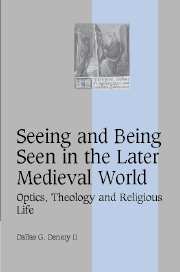Book contents
- Frontmatter
- Contents
- Acknowledgments
- INTRODUCTION: VISION AND VISUAL ANALOGY DURING THE LATER MIDDLE AGES
- 1 PONDERARE STATERA MEDITATIONIS: SELF AS SELF-PRESENTATION IN EARLY DOMINICAN RELIGIOUS LIFE
- 2 THE DEVIL IN HUMAN FORM: CONFESSION, DECEPTION AND SELF-KNOWLEDGE
- 3 PETER OF LIMOGES, PERSPECTIVIST OPTICS AND THE DISPLACEMENT OF VISION
- 4 NORMALIZING ERROR: PETER AUREOL ON THE IMPORTANCE OF APPEARANCES
- 5 PROBABILITY AND PERSPECTIVE: NICHOLAS OF AUTRECOURT AND THE FRAGMENTATION OF VISION
- CONCLUSION: VISION, PROMISE, DEFERRAL
- Bibliography
- Index
- Cambridge Studies in Medieval Life and Thought Fourth series
CONCLUSION: VISION, PROMISE, DEFERRAL
Published online by Cambridge University Press: 18 July 2009
- Frontmatter
- Contents
- Acknowledgments
- INTRODUCTION: VISION AND VISUAL ANALOGY DURING THE LATER MIDDLE AGES
- 1 PONDERARE STATERA MEDITATIONIS: SELF AS SELF-PRESENTATION IN EARLY DOMINICAN RELIGIOUS LIFE
- 2 THE DEVIL IN HUMAN FORM: CONFESSION, DECEPTION AND SELF-KNOWLEDGE
- 3 PETER OF LIMOGES, PERSPECTIVIST OPTICS AND THE DISPLACEMENT OF VISION
- 4 NORMALIZING ERROR: PETER AUREOL ON THE IMPORTANCE OF APPEARANCES
- 5 PROBABILITY AND PERSPECTIVE: NICHOLAS OF AUTRECOURT AND THE FRAGMENTATION OF VISION
- CONCLUSION: VISION, PROMISE, DEFERRAL
- Bibliography
- Index
- Cambridge Studies in Medieval Life and Thought Fourth series
Summary
From speculation to preaching, Nicholas of Autrecourt's work returns us to where we began, to Dominican friars as they attempt to balance the need for study with the demands of their religious calling, with the demand to preach. It is a curious, oddly symbolic, return. Nicholas envisions the return to preaching as an escape from the snares of speculation and the natural appearances, but the experience of preachers tells a different story. Preachers, trained as they were to always think of themselves as if on public display, in many ways most fully embodied the medieval experience of vision and its effects. Peter of Limoges addressed this experience in his popular preaching manual, the Tractatus moralis de oculo, when he articulated the practice of medieval religious life in the language of perspectivist optics. In doing so, he simultaneously articulated the problems that those practices had generated for the religious as explicitly visual problems, as problems arising from a distinction between what appears and what really exists, between seeing and being seen. These are precisely the same sorts of problems that occupied the minds of many fourteenth-century theologians like Peter Aureol and Bernard of Arezzo. In the final analysis, Nicholas' turn from speculation to preaching is a turn to the very practices that had problematized the relation between self and self-presentation, between appearance and reality, in the first place.
- Type
- Chapter
- Information
- Seeing and Being Seen in the Later Medieval WorldOptics, Theology and Religious Life, pp. 169 - 180Publisher: Cambridge University PressPrint publication year: 2005



